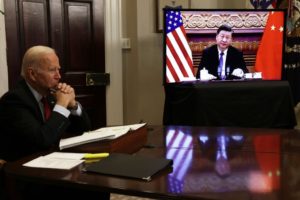
President Biden spoke with President Xi Jinping of China over a secure video teleconference Friday (March 18). The two-hour discussion between the two leaders had Russia’s invasion of Ukraine at the top of the agenda. But, as important as the call was supposed to be in the buildup, the 120-minute chat did not satisfy expectations. Early reports on the conversation indicated the US president pressed Xi not to provide Russian President Putin aid in military equipment or help avoid the worldwide economic sanctions levied on Moscow.

In anticipation of the call, Biden’s ability to persuade Xi to decline any Russian request for a lifeline to allow the Kremlin to continue its attacks on Ukraine was on display. But Biden, according to early accounts, went further asking Xi for help by joining NATO-levied sanctions. That overreach was met with a resounding no from the Chinese Communist Party (CCP) leader. “Sweeping and indiscriminate sanctions would only make the people suffer. If further escalated, they could trigger serious crises in global economy and trade, finance, energy, food, and industrial and supply chains, crippling the already languishing world economy and causing irrevocable losses,” was the official CCP Foreign Ministry response, according to Steven Nelson reporting for the New York Post.
For the White House, the opportunity to talk candidly with Xi was a test of the US president’s gravitas in geopolitical persuasion. “He made clear what the implications and consequences would be if China provides material support to Russia as it conducts its brutal attacks against Ukrainian cities and civilians,” White House press secretary Jen Psaki said in her press briefing on the teleconference. Getting the “implications and consequences” message across seemed to be the main objective of the call from the Biden administration’s perspective.
The People’s Republic of China’s (PRC) Foreign Ministry was the first to recap the two-hour phone conversation. “The Ukraine crisis is something we don’t want to see…Conflict and confrontation are not in anyone’s interests. Peace and security are the most treasured treasures of the international community,” the Ministry of Foreign Affairs spokesman reported. Furthermore, in the category of can’t we all just be friends, “All sides need to jointly support Russia and Ukraine in having dialogue and negotiation that will produce results and lead to peace. The US and NATO should also have dialogue with Russia to address the crux of the Ukraine crisis and ease the security concerns of both Russia and Ukraine,” a Chinese government statement offered. The CCP must have missed the constant talks between the US, NATO, Russia, and Ukraine the three months before Putin decided to attack. Nevertheless, there was no indication that China was backing away from supporting its new BFF.
“In starkly contrasting readouts by the US and China of the call Friday morning between President Biden and Chinese President Xu Jinping, the US emphasized ‘imposing costs on Russia’ while the Chinese called for an evenhanded approach that recognized ‘the security concerns of both Russia and Ukraine,’” was the way Fox News characterized the teleconference. To the non-aligned nations of the world, the takeaway is the US is strident, belligerent, and self-serving, while the CCP is reasonable and moderate. But, as before, regardless of the measured words, there was no hint of condemning the Russian war machine’s destruction of Ukraine or the fate of, according to UN estimates, 6.4 million displaced Ukrainians.
Biden and Xi talking and having different takes on their conversation is not surprising. The US was focused on getting China to repudiate any request from Russia for aid. Beijing was equally as single-minded in not making any such commitment and changing the subject. In looking at previous meetings between CCP representatives and the Biden administration, the participants talked in the same room, but the conversations were at best on parallel paths and generally diverging. Talking past one another is not a new phenomenon for the Biden and Xi governments. China believes it has the moral foreign policy high ground with its goal of achieving its “Belt and Road” initiative of being the dominant economic and military power in the world. The outcome of every encounter with the current US leadership will be manipulated to achieve the PRC endgame. Having a phone chat with President Biden will not change Beijing’s perceived destiny. Xi’s administration evidently believes a relationship with Russia is a steppingstone toward reaching its aspirations. The US, NATO, the European Union, and sadly Ukraine are on their own to resolve the Kiev crisis.









